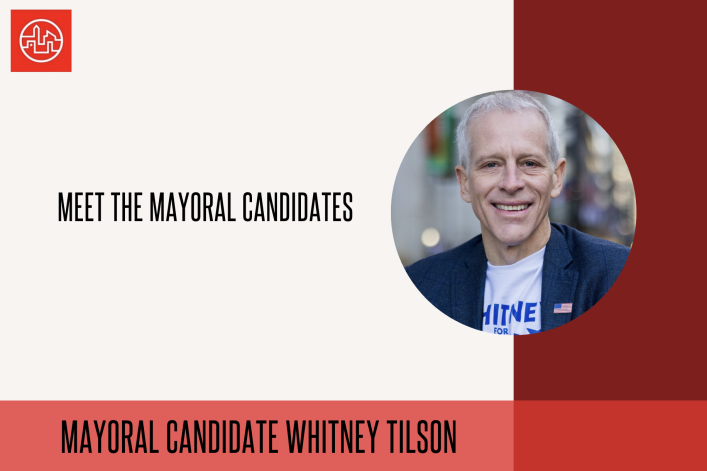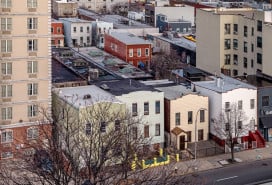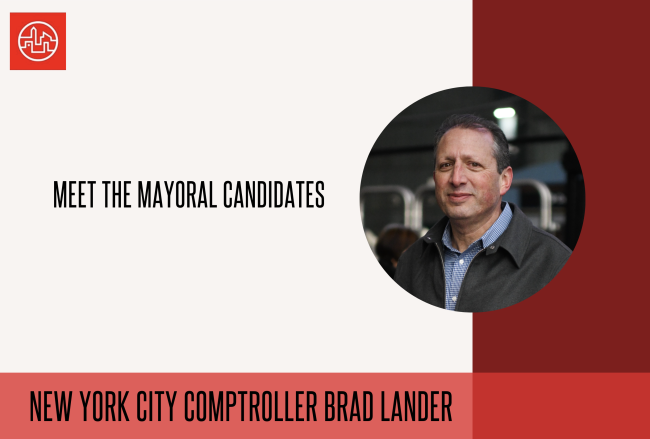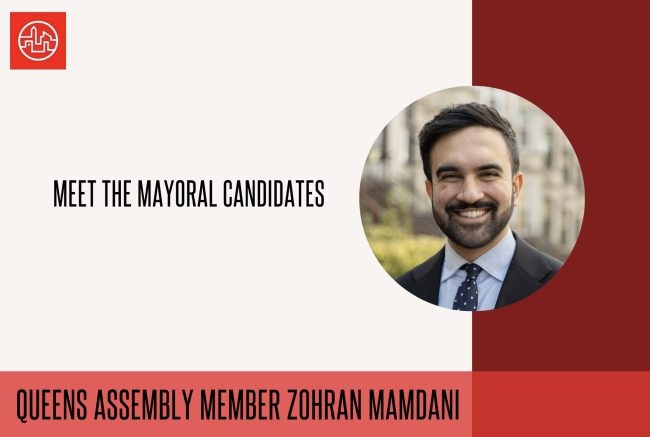Whitney Tilson wants to speed up development and make it easier for small landlords to evict non-paying tenants
- Tilson said there should be a different standard for evictions when an apartment owner is evicting a roommate
- Brick caught up with Whitney Tilson as part of our series of interviews with the NYC mayoral candidates
- Tilson would put pro-real estate officials in his administration to support investment and development

Whitney Tilson described himself as a "life-long hardcore Democrat."
Brick Underground/Celia Young
Whitney Tilson, a long-time Democrat and former hedge fund manager, wants to hurry up housing construction in New York City by partnering with the real estate industry.
Tilson is one of the many candidates running for New York City mayor. As the race heats up, Brick Underground is interviewing the candidates who—if victorious—will go on to shape housing development in New York City.
The mayor will oversee city agencies that regulate landlords, the implementation of NYC’s landmark climate law, Local Law 97, and new construction enabled by the City of Yes for Housing Opportunity plan.
In short, it’s a big job, and there’s a lot of candidates who want to do it. Brick Underground caught up with Whitney Tilson last month to talk about how he’d tackle housing if he were to become NYC’s next mayor.
[Editor's note: Brick Underground is interviewing the 2025 New York City mayoral candidates about their housing policy proposals. Please check out our previous interviews with Queens Assembly member Zohran Mamdani, New York City Comptroller Brad Lander, State Senator Zellnor Myrie, former New York City Comptroller Scott Stringer, and former New York State Assembly member Michael Blake.]
Tilson criticized the 2019 rent reforms and said that he’d work with real estate developers to build housing across NYC. He also said he’d make it easier for small landlords to evict tenants who stop paying and would not support a rent freeze.
All candidates answered a quick series of questions about major NYC housing issues before going into detail about their own proposals. This interview has been edited for length and clarity.
| Lightning round questions | Whitney Tilson's answers |
|---|---|
| Local Law 97: Do you think fines should be delayed or enforced for buildings not in compliance with Local Law 97? | I do believe they should be delayed. I'm concerned that we have layered on so many [requirements]—from scaffolding, etc—that we are exacerbating the housing crisis in this city. I think we need to go through all of the rules and regulations around housing and the construction of new housing, and figure out if all of these are necessary, and can we do something to reduce the costs? |
Short-term rentals: Would you support rolling back NYC’s short-term rental restrictions and allowing small homeowners to rent out their properties for fewer than 30 days without the owner on the premises? | I wouldn't change the current regulations. What I would focus on, though, is easing longer-term rentals. I have talked to people who own apartments. We have made it so difficult to evict anyone who stops paying, that most of those people aren't willing to rent. … I do believe there should be protections against rapid evictions, but we've sent the pendulum too far the other way. I think there should be a different standard for evicting somebody who’s [living] in your home and stops paying you, or starts trashing the place, or starts doing drugs or something like that, as opposed to someone who owns a whole building where it's more professional. |
Rent freeze: Would you support a rent freeze for the city’s rent-stabilized apartments? | No, I do not. One of the main reasons we have a housing crisis [in] what should be the greatest real estate market in the country [is that] we've turned into a terrible and impossible market. Everyone in the real estate industry I know says two things: We would love to build more housing. … The second thing they say: we’ve given up on New York, we won't invest here anymore. We're going down to Alexandria, Virginia or to Nashville. … [Here] we’re treated like the enemy. We need to have a 180-degree change in attitude. |
| Housing vouchers: Would you support expanding eligibility for the CityFHEPS housing voucher program, as was passed by the Council in 2023? | I’m not familiar with that, so I can’t comment. [Editor’s note: In a subsequent text to Brick Underground, Tilson said: “I looked into it and support FHEPS—and want to reduce the need for it by catalyzing the construction and rehabilitation of A LOT [sic] more housing in NYC!”] |
| Affordable apartments: What would you do to incentivize affordable, family-sized apartments? | There are a number of pieces to it but I think the City of Yes [for Housing Opportunity] legislation was the right choice. It eases some of the most onerous zoning restrictions that date back more than half a century. … What passed, by all accounts, is a step in the right direction. But 80,000 units in 15 years is at best 10 percent of what’s necessary. So I’m going to go in and fight for the other 90 percent. I have talked to developers who want to construct affordable housing in the city. I consistently hear a couple of obstacles that are totally unnecessary; one is the permitting process, which takes way too long. I think we should be doing a lot more [projects like the New York City Authority’s Chelsea Houses, where] the development partner would come in and front the money and build brand new buildings in empty parking lots [and] nobody gets displaced. |
You mentioned that the City of Yes for Housing Opportunity is only 10 percent of what we need. What strategies would you use to incentivize housing development?
We’d use all the strategies available, because there’s no magical bullet. … The existing housing stock is declining, and the 2019 Housing Stability and Tenant Protection Act that passed in the state, I think parts of it are necessary to protect against abuses from bad actors, but it just went too far.
Nobody really knows, but somewhere between 50,000 and 100,000 apartments right now are vacant, and these are not cases of forcing anybody out. [Editor’s note: A city survey found that 26,310 rent-stabilized apartments were vacant in 2023. That’s down from the more than 61,000 rent-stabilized units that were vacant in 2021, The City reported.]
[When long-time tenants move out] under the law as passed in 2019, it is not the tenant but the apartment that is protected, and the landlord can’t raise the rent. But here’s the problem: the apartment needs at minimum $200,00 to $300,000 of investment because there hasn’t been a dollar put into it for decades, but it makes absolutely no sense for any landlord to put a dollar into it when the rent is locked at $700 a month and it's a $2,500 a month apartment. As a result, the landlords are taking a lot of apartments off the market.…There’s got to be some compromise in the middle.
[I know a developer] in the midst of a two-year environmental review. Obviously, some old buildings may have lead and asbestos and there should be an environmental review. But I’ve talked to real estate folks who [say] in any other city that’s two months max. It takes two years in New York.…There should be a fast track for good operators. I’ll give you another example. [I know] a large-scale developer in Brooklyn. He said our average time to development went from two years to four years after Bloomberg left, and everything just got slowed down and uncooperative.
I hear over and over again: “They treat us like the enemy.” It’s the city government. It’s not just some NIMBY types, anti-development types, or neighborhood activists—which are also an enormous headache. The one thing I can certainly control as mayor is to put pro-development people who will roll out the welcome mat, just like every other city does for people who want to invest tens, hundreds of millions, or even billions of dollars into our city to alleviate the housing crisis. We’ve got to compete, and not punch ourselves in the face and drive away investment.
We’ve talked a lot about development, but a big issue during the campaign has been affordability. New housing would greatly impact affordability but it takes time to build. What would your plan be to help folks struggling to afford the cost of rent right now?
The long-term solution is: we need to dramatically increase our construction of all sorts of housing. Right now it's at the very high end and the very low end. But trust me, the people who would build that housing, they want to build in New York. It’s such an attractive market with our sky high rents. It's purely a supply problem here.
I think within less than a year, if the state modified the law and allowed people to renovate their apartments—just renovations of existing apartments in rent stabilized buildings with long-term tenants—as tenants leave and the apartments become vacant, a lot of these renovations could be done in well less than a year. And that could bring [thousands of] units on the market in less than a year. And for perspective I think there’s only 28,000 units being built in New York every year.
It could be very rapid, if we passed a law that made it easier for people [to rent out their bedrooms.] Again, I’m not talking about short term Airbnb to tourists. I’m talking about long-term New Yorkers renting out a bedroom or two in their apartments in a way that makes sense for them, where they’re not terrified of someone establishing residency and being unable to evict someone.
[Editor's note: Under New York’s Multiple Dwelling Law, it is illegal for landlords of Class-A multiple dwellings to rent out individual rooms to tenants. But if you own your apartment or house and want to get help with expenses, you can have a roommate, who must be given access to the entire property.]
Is there anything else you’d like to add?
I am a life-long hardcore Democrat, running in the Democratic primary. But in many ways I am running against my own party, because as often happens in one-party city or one-party states, good ideas—in terms of permitting, regulations, zoning, eviction protections, etc.—good ideas get taken to extremes, and turned into bad ideas. In all of these areas, I think we need to take a fresh look and see where we can ease up a bit. I think the only person capable of doing that—the reason I’m running—is someone who’s outside the system.
The problem is that people on one side of this decision tend to be very well organized and very active, but the broad mass of people who are just paying way too much for their housing, tend not to be quite as organized and don’t have a lobbying group. We need an independent mayor and a business person who can make New York City’s real estate market and business environment super attractive.
The career politicians don’t even understand that language, don’t even understand that we need to make New York an attractive place for investors to invest their money to get a decent return on that money. And they want to invest, but we can’t take it for granted. I think we’ve been too complacent that New York is so rich, that it’s such an incredible city, and this complacency is really killing us. So I’m going to come in and have a whole different attitude than I think everyone else in this race.
I should mention that I’m seeing this up close and personal. I cannot believe what my older daughters are paying for shared apartments, small apartments. My daughters went to good colleges, have good jobs, and have roommates—and still, they’re paying far more than 30 percent of their after tax income [in rent]. I see it up close and hear about it every day.




























